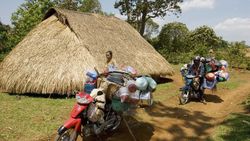
by Chloe Poynton
When Leonardo DiCaprio won a Golden Globe on Jan. 10 for his work in “The Revenant,” he paid tribute to indigenous communities around the world. “It is time that we recognized your history, and that we protect your indigenous lands from corporate interests and people that are out there to exploit them,” he said. He’s right. The land of indigenous people needs to be protected, and governments and corporations need to make a commitment to do so.
Indigenous peoples live in more than 70 countries, including the Unites States, and represent approximately 5% of the world’s population. They remain among the world’s most marginalized communities. Taken as a group, they have lower levels of literacy, higher rates of poverty and malnutrition, and less access to health services than other members of society.
Indigenous communities also experience higher rates of landlessness and displacement, which impedes their ability to ensure their economic well-being and cultural heritage. As the United Nations notes, “the survival and development of indigenous peoples’ particular ways of life, their traditional knowledge, their handicrafts and other cultural expressions have, since time immemorial, depended on their access and rights to their traditional lands, territories and natural resources.”
Access to traditional land remains fundamental to the well-being of indigenous groups. But “land grabs” by governments and corporations are on the rise. In the last decade, national governments have sold over 81 million acres of land—much of it indigenous—to foreign investors without the permission of those inhabiting the land. In Cambodia, for example, more than 400,000 indigenous peoples have been forcibly evicted from lands since 2003 to allow for the production of rubber and sugar, and the construction of new properties. In Guatemala, in 2001, 760 indigenous families were forced off of their land in Guatemala’s Polochic Valley to make way for sugar cane production.
These land grabs are in direct violation of internationally recognized human rights standards, including both International Labor Organization Convention 169 on the rights of indigenous and tribal people, and the UN Declaration on the Rights of Indigenous Peoples (UNDRIP). Under Article 10 of UNDRIP, indigenous peoples have the right to not be forcibly removed from their lands. Any relocation must be contingent on the “free, prior and informed consent” of those inhabiting the land.
This right is essential to the protection of indigenous land and culture. It should be protected by states through national legislation—and respected by companies through their human rights due diligence activities.
As a consultant working with businesses on human rights issues, I often advise companies on how best to avoid complicity in land grabs. Whether it is food and beverage companies whose suppliers may be growing produce on indigenous land without community consent, companies seeking to extract natural resources on indigenous land, or hotel companies expanding into growth markets where indigenous groups have historically claimed rights, businesses around the globe are increasingly faced with concerns regarding land rights.
In these cases, companies should take the following steps:
- Commit to respecting the land rights of indigenous communities and avoid causing or contributing to land grabs through a public commitment or policy.
- Conduct ongoing human rights due diligence to understand where current and potential risks lie.
- Commit, where the use of indigenous land is sought, to respecting the principles of free, prior, and informed consent and respect the decision of indigenous groups—whether they choose to provide consent or not.
This requires that the indigenous group’s decision in each case be free from coercion, intimidation or manipulation. Prior to making any decision or action related to the land, companies need to ensure that affected indigenous communities have sufficient time to determine what is in the best interests of their community. And companies have to make sure that indigenous groups are informed of all relevant information related to the proposed activity, both through direct, inclusive engagement and by providing relevant documents, resources and studies.
It is only when all off these principles are met that an indigenous community is able to provide—or withhold—its consent.
There are positive examples of companies making changes to ensure respect for indigenous land rights. Oxfam’s Behind the Brands campaign—which ranks ten of the world’s largest food and beverage companies on their performance related to seven key issues, including land—led Coca-Cola, Nestle, and PepsiCo to commit to “zero tolerance” for land grabs throughout their supply chains. Coca-Cola followed their commitment up by undertaking nearly 30 independent third-party country studies to understand land rights risks at a country level and issuing guidance to their suppliers on respecting land rights.
These steps should be applauded. But such corporate commitments should be the rule—not the exception.












